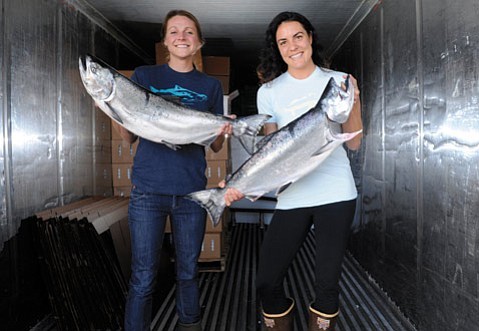
ImpactAlpha.com -- The ocean's problems are well known. Solutions, not so much. And opportunities to invest in those solutions have been even harder to find.
That's changing, in no small part thanks to Monica Jain and her Fish 2.0 business competition, which has just announced the 37 seafood and aquaculture companies that will compete for prizes and attention at the contest's final event at Stanford in November.
The seafood entrepreneurs, representing both start-up and growth-stage companies, will get a chance to pitch a room of investors, five-minutes for finalists and 90 seconds for semifinalists. But Fish 2.0 represents perhaps a bigger opportunity for investors and would-be sustainable seafood funders themselves.
After soliciting 170 entries and putting qualifiers through rounds of review and mentoring, Fish 2.0 is providing access to a global sustainable seafood deal pipeline. The range of ventures have vetted approaches to land- and sea-based aquaculture; rationalized wild-capture supply chain; "fishtech" innovations such as tiny sensors and Big Data analysis; and other promising areas.
Jain said the diversity and breadth of the finalists testifies to worldwide innovation in seafood. The final contestants, chosen from among 170 applicants, come from as far away as Vanuatu, Fiji, Malaysia and Thailand, as well as Mexico, Costa Rica, Chile and the U.S. and Canada. Jain, who launched Fish 2.0 with a first cycle of competition in 2013, made a big international push this year, with workshops around Asia and the South Pacific (see, "Fish 2.0 is Searching the Seven Seas for Seafood Entrepreneurs").
"We are especially excited to see sustainability and invention taking root in the markets where the fish are coming from, not just where they are consumed," she said.
The dozen wild-capture ventures among the contestants reflect growing trends in the approximately $500 million market. Fishermen and women are moving to keep more of the value of seafood in local markets, with value-added processing and higher quality. Distributors are bringing to market higher-end consumer products that are traceable back to their source, and make eating sustainable seafood easier and more appealing (see, "How Much Would You Pay for a Can of Tuna?").
The range of aquaculture finalists testifies to the dramatic growth of fish-farming as a solution for sustainable seafood, both on land and in ocean pens. Companies farming steelhead, Pacific yellowtail, tilapia, shrimp, scallops and crab present investors a bounty of opportunities (see, "Investors Target Growing Demand for Healthy, Sustainable, Tasty Fish").
An emerging trend with far-reaching implications is the maturity of traceability technology to give distributors and consumers better information about the source of their seafood. Companies like Pelagic Data Systems and Shellcatch in California, TRUfish in North Carolina and Fair Agora Asia, based in Thailand, are pursuing market innovations with potential to reward best practices and punish bad actors (see, "How Tracing Seafood Can Protect Humans, Too").
More than in the first round of the Fish 2.0 competition in 2013, many of the current contestants are generating real revenues, demonstrating the market for new approaches.
"They're each offering something different," Jain concludes. "There is room in the market for most, if not all, of them to grow."
ImpactAlpha provides investment news for a sustainable edge. Get our newsletter or follow @impactalpha.